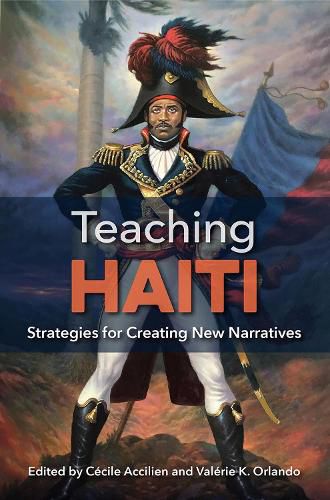Readings Newsletter
Become a Readings Member to make your shopping experience even easier.
Sign in or sign up for free!
You’re not far away from qualifying for FREE standard shipping within Australia
You’ve qualified for FREE standard shipping within Australia
The cart is loading…






This title is printed to order. This book may have been self-published. If so, we cannot guarantee the quality of the content. In the main most books will have gone through the editing process however some may not. We therefore suggest that you be aware of this before ordering this book. If in doubt check either the author or publisher’s details as we are unable to accept any returns unless they are faulty. Please contact us if you have any questions.
Approaching Haiti's history and culture from a multidisciplinary perspective
This volume is the first to focus on teaching about Haiti's complex history and culture from a multidisciplinary perspective. Making broad connections between Haiti and the rest of the Caribbean, contributors provide pedagogical guidance on how to approach the country from different lenses in course curricula. They offer practical suggestions, theories on a wide variety of texts, examples of syllabi, and classroom experiences.
Teaching Haiti dispels stereotypes associating Haiti with disaster, poverty, and negative ideas of Vodou, going beyond the simplistic neocolonial, imperialist, and racist descriptions often found in literary and historical accounts. Instructors in diverse subject areas discuss ways of reshaping old narratives through women's and gender studies, poetry, theater, art, religion, language, politics, history, and popular culture, and they advocate for including Haiti in American and Latin American studies courses.
Portraying Haiti not as "the poorest nation in the Western Hemisphere" but as a nation with a multifaceted culture that plays an important part on the world's stage, this volume offers valuable lessons about Haiti's past and present related to immigration, migration, locality, and globality. The essays remind us that these themes are increasingly relevant in an era in which teachers are often called to address neoliberalist views and practices and isolationist politics.
Contributors:Cecile Accilien | Jessica Adams | Alessandra Benedicty-Kokken | Anne M. Francois | Regine Michelle Jean-Charles | Elizabeth Langley | Valerie K. Orlando | Agnes Peysson-Zeiss | John D. Ribo | Joubert Satyre | Darren Staloff | Bonnie Thomas | Don E. Walicek | Sophie Watt
$9.00 standard shipping within Australia
FREE standard shipping within Australia for orders over $100.00
Express & International shipping calculated at checkout
This title is printed to order. This book may have been self-published. If so, we cannot guarantee the quality of the content. In the main most books will have gone through the editing process however some may not. We therefore suggest that you be aware of this before ordering this book. If in doubt check either the author or publisher’s details as we are unable to accept any returns unless they are faulty. Please contact us if you have any questions.
Approaching Haiti's history and culture from a multidisciplinary perspective
This volume is the first to focus on teaching about Haiti's complex history and culture from a multidisciplinary perspective. Making broad connections between Haiti and the rest of the Caribbean, contributors provide pedagogical guidance on how to approach the country from different lenses in course curricula. They offer practical suggestions, theories on a wide variety of texts, examples of syllabi, and classroom experiences.
Teaching Haiti dispels stereotypes associating Haiti with disaster, poverty, and negative ideas of Vodou, going beyond the simplistic neocolonial, imperialist, and racist descriptions often found in literary and historical accounts. Instructors in diverse subject areas discuss ways of reshaping old narratives through women's and gender studies, poetry, theater, art, religion, language, politics, history, and popular culture, and they advocate for including Haiti in American and Latin American studies courses.
Portraying Haiti not as "the poorest nation in the Western Hemisphere" but as a nation with a multifaceted culture that plays an important part on the world's stage, this volume offers valuable lessons about Haiti's past and present related to immigration, migration, locality, and globality. The essays remind us that these themes are increasingly relevant in an era in which teachers are often called to address neoliberalist views and practices and isolationist politics.
Contributors:Cecile Accilien | Jessica Adams | Alessandra Benedicty-Kokken | Anne M. Francois | Regine Michelle Jean-Charles | Elizabeth Langley | Valerie K. Orlando | Agnes Peysson-Zeiss | John D. Ribo | Joubert Satyre | Darren Staloff | Bonnie Thomas | Don E. Walicek | Sophie Watt